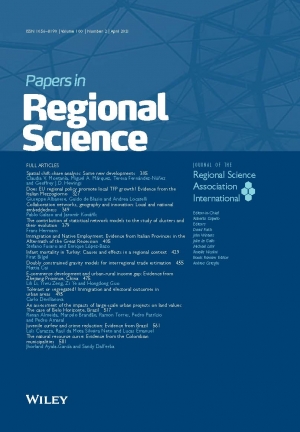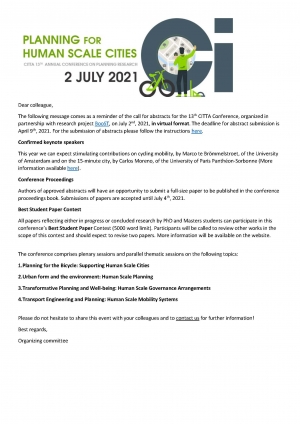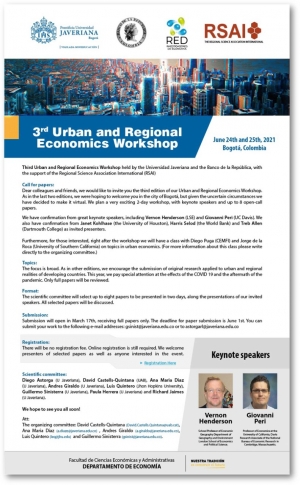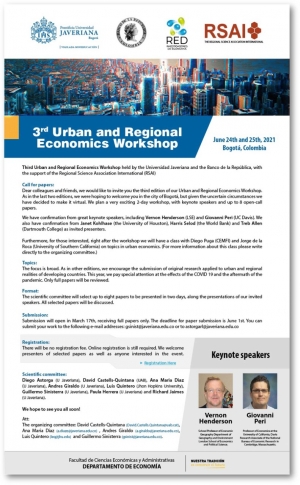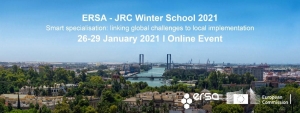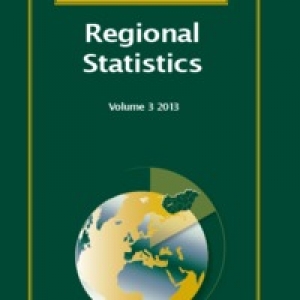Awards
Elisabete Martins
OECD job opening - Cities and Urbanisation in Africa
The OECD has opened a renewable 2-year position to work on cities and urbanisation in Africa. The position is targeted at recent PhD graduates in economics, geography or related disciplines with expertise on cities in developing countries.
The closing date for the position is April 29. Interested candidates find more information and can apply online at https://oecd.taleo.net/careersection/jobdetail.ftl?job=14324.
The latest issue of Papers in Regional Science is available! Volume 100, 2 (April 2021)
|
Papers in Regional Science Pages: 303-602 April 2021 |
ISSUE INFORMATION
![]() Free Access
Free Access
Pages: 303-304 | First Published: 06 April 2021
FULL ARTICLES
Spatial shift‐share analysis: Some new developments
Claudia V. Montanía, Miguel A. Márquez, Teresa Fernández‐Núñez, Geoffrey J.D. Hewings
Pages: 305-325 | First Published: 15 September 2020
Does EU regional policy promote local TFP growth? Evidence from the Italian Mezzogiorno
Giuseppe Albanese, Guido de Blasio, Andrea Locatelli
Pages: 327-348 | First Published: 02 September 2020
Collaboration networks, geography and innovation: Local and national embeddedness
Pablo Galaso, Jaromír Kovářík
Pages: 349-377 | First Published: 30 September 2020
![]() Open Access
Open Access
The contribution of statistical network models to the study of clusters and their evolution
Frans Hermans
Pages: 379-403 | First Published: 10 October 2020
Stefano Fusaro, Enrique López‐Bazo
Pages: 405-428 | First Published: 17 October 2020
Infant mortality in Turkey: Causes and effects in a regional context
Firat Bilgel
Pages: 429-453 | First Published: 19 September 2020
![]() Open Access
Open Access
Doubly constrained gravity models for interregional trade estimation
Mattia Cai
Pages: 455-474 | First Published: 30 October 2020
E‐commerce development and urban‐rural income gap: Evidence from Zhejiang Province, China
Lili Li, Yiwu Zeng, Zi Ye, Hongdong Guo
Pages: 475-494 | First Published: 26 August 2020
Tolerant or segregated? Immigration and electoral outcomes in urban areas
Carlo Devillanova
Pages: 495-515 | First Published: 03 November 2020
Renan Almeida, Marcelo Brandão, Ramon Torres, Pedro Patrício, Pedro Amaral
Pages: 517-559 | First Published: 31 August 2020
Juvenile curfew and crime reduction: Evidence from Brazil
Luís Carazza, Raul da Mota Silveira Neto, Lucas Emanuel
Pages: 561-579 | First Published: 01 September 2020
The natural resource curse: Evidence from the Colombian municipalities
Jhorland Ayala‐García, Sandy Dall'erba
Pages: 581-602 | First Published: 29 September 2020
Executive Director of Bloustein School of Planning and Public Policy Informatics Program and Non-Tenure Track Associate Professor or Professor of Practice
The Bloustein School of Planning and Public Policy in Rutgers University, New Brunswick, invites applications for the position of Executive Director of Urban and Public Policy Analytics and Health Informatics Program. This is a full-time non-tenured Associate Professor or Professor of Practice position in the School, for a period of three years, with the possibility of renewal, subject to availability of funding. Applicants with significant professional experience are encouraged to apply.
Rutgers New Brunswick is a Big 10 university and a member of AAU. The school has several highly ranked programs in the areas of city and regional planning, public policy, health administration, undergraduate public health, and related areas. A new academic area is Public Informatics, with a current focus on Urban Planning and Public Policy, and a degree focus on Urban Analytics, but with plans to expand to new areas over the next few years.
Our research centers are focused on transportation, workforce development, the built and natural environments, urban and civic informatics, survey research, and other areas. The school also has cross-cutting research clusters on Upstream Determinants of Health https://bloustein.rutgers.edu/centers/health-at-bloustein/ and the Future of Cities, Society, Work and Health. https://bloustein.rutgers.edu/centers/smart-civic-tech/
We seek to appoint a senior practitioner who will administer our current programs in the Informatics area, including the Master of Public Informatics, a Graduate Certificate in Urban and Public Informatics, and a soon-to-be offered online Master of Public Informatics, and to recruit students into and grow those programs. We further expect that working with other faculty, and instructional technology developers, the successful candidate will establish new academic programs, including online programs, certificate programs that are targeted to mid career professionals, as well as programs in new areas of specialization. Based on our Strategic Plan, expected areas of growth include Health Analytics and Public Policy Analytics, and related areas.
The candidate will teach graduate-level courses on some of the following topics: data science, machine learning, GIScience, and other analytics; programming; optimization techniques; network analysis; domain-specific technology and tools-oriented courses; project management; technology strategy; and support student projects and independent learning. The ideal candidate will extend the school’s already extensive government and industry engagement in the technology and analytics space, and will establish student internship and research programs in these areas.
All information at: https://jobs.rutgers.edu/postings/129020
REMINDER I CITTA 2021 - CALL FOR ABSTRACTS - 13th Annual Conference on Planning Research – ‘Planning for Human Scale Cities'
Dear colleague,
The following message comes as a reminder of the call for abstracts for the 13th CITTA Conference, organized in partnership with research project BooST, on July 2nd, 2021, in virtual format. The deadline for abstract submission is April 9th, 2021. For the submission of abstracts please follow the instructions here.
Confirmed keynote speakers
This year we can expect stimulating contributions on cycling mobility, by Marco te Brömmelstroet, of the University of Amsterdam and on the 15-minute city, by Carlos Moreno, of the University of Paris Panthéon-Sorbonne (More information available here).
Conference Proceedings
Authors of approved abstracts will have an opportunity to submit a full-size paper to be published in the conference proceedings book. Submissions of papers are accepted until July 4th, 2021.
Best Student Paper Contest
All papers reflecting either in progress or concluded research by PhD and Masters students can participate in this conference’s Best Student Paper Contest (5000 word limit). Participants will be called to review other works in the scope of this contest and should expect to revise two papers. More information will be available on the website.
The conference comprises plenary sessions and parallel thematic sessions on the following topics:
1.Planning for the Bicycle: Supporting Human Scale Cities
2.Urban form and the environment: Human Scale Planning
3.Transformative Planning and Well-being: Human Scale Governance Arrangements
4.Transport Engineering and Planning: Human Scale Mobility Systems
Please do not hesitate to share this event with your colleagues and to contact us for further information!
Best regards,
Organizing committee
http://citta.fe.up.pt/
CITTA I Centro de Investigação do Território Transportes e Ambiente
FEUP I Faculty of engineering of the University of Porto
DEC I Department of Civil Engineering
Call for Papers | 3rd Urban and Regional Economic Workshop, 24-25 June 2021, Bogotá, Colombia
Call for Papers | 3rd Urban and Regional Economic Workshop, 24-25 June 2021, Bogotá, Colombia
ERSA-JRC Winter School 2021: Extended Application deadline until 25 November
Call for Application extended until 25 November!
Are you a smart young researcher* looking for state-of-the art knowledge around the topic of #smartspecialisation, willing to present your research and get precious feedback from outstanding professors and experts.
> Don't miss out this last chance > Apply now!
*Doctoral and Postdoctoral students as well as junior researchers with less than 5 years of experience.
Lecturers and Lab Sessions Update
Confirmed lectures:
|
The laboratory Sessions Update will feature:
· Tools and data for Smart Specialisation
· Evidence from S3 implementation and monitoring
· Smart Specialisation for Sustainable Development Goals
>>> Stay tuned: More updates to be posted shortly on the Winter School website
ERSA-JRC Winter School 2021 jointly organised with the Joint Research Centre of the European Commission (Seville) and in partnership with the ERSA Spanish Section AECR

Follow us and join the conversation on #ERSAWinterSchool #smartspecialisation
Call for Papers and Special Session Proposals | 28th APDR Congress | 16-17 September 2021, UTAD, Vila Real, Portugal
Call for Papers and Special Session Proposals
The APDR invite regional scientists, economists, economic geographers, urban planners, policy makers, and researchers of related disciplines to participate in the 28th APDR Congress that will be held from 16 to 17 of September, 2021, University of Trás-os-Montes e Alto Douro (UTAD), placed in Vila Real, in the Northeast of Portugal
Beyond the various themes related to regional science this congress will focus on the emerging topic of Green and inclusive transitions in Southern European regions: What can we do better?.
The call for papers and Special Session Proposals are open and your participation is very welcome!
Themes of specific interest are:
- RS01 - Smart Sustainable Development
- RS02 - New Urban Agenda and Sustainable Development Goals
- RS03 - Circular Economy at Regional, National and International Level
- RS04 - Spatial Aspects of the Green Deal
- RS05 - Energy, Transports and Mobility, Agri-food and other Systemic Transitions
- RS06 - Climate Change Mitigation and Adaptation
- RS07 - Spatial Allocation of Public Goods and Services
- RS08 - Migration, Integration, Growth and Welfare
- RS09 - Regional Resilience and Crisis
- RS10 - Theory, Qualitative and Mixed-Methods in Regional Science
- RS11 - Natural Environment and Urban Development
- RS12 - Natural Environment and Rural Development
- RS13 - Low-Density Regions and Development
- RS14 - Territorial Cohesion and Asymmetries
- RS15 - Innovation, Entrepreneurship and Regional Development
- RS16 - Quality of life, Wellbeing and Happiness
- RS17 - Tourism, Sports and Regional Development
- RS18 - Big and Available Data for Regional Science
- RS19 - Geographic Information Systems and Location Modelling
- RS20 - Systemic Analysis of Transport and Communication Networks
- RS21 - Operational Models for Cities and Regions
- RS22 - Spatial Econometrics
- RS23 - Ecological Economics and Ecosystems Services approaches and methods
Deadline for Special Session proposals: June 14, 2021. Proposals should be sent by email to the secretariat of the Congress (This email address is being protected from spambots. You need JavaScript enabled to view it.).
Deadline for Abstracts submissions: July 5, 2021. Authors should submit their abstracts through online submission system by following the link https://cmt3.research.microsoft.com/APDR2021.
All information at the congress website: http://www.apdr.pt/congresso/2021
Looking forward to meeting you in Vila Real!
The Organizing Committee and the Board of APDR 28th APDR Congress
New Post-doctoral Fellow/Research Associate | Division of Public Policy
The Division of Public Policy (PPOL) seeks to recruit a new Post-doctoral Fellow/Research Associate with specialty in the broad areas of urban policy, including transportation, land use, economic development, housing, and social equity. Main tasks of the appointee include conducting research on a wide range of urban topics which will be determined by the faculty supervisor, assisting in supervising PhD and Master students in the team, and developing his/her own research agenda.
Applicants should have a recognized PhD degree in relevant discipline, including but not limited to, transportation engineering, urban planning, urban studies, regional science, geography, urban economics, and public policy. The successful applicant is expected to have strong analytical skills, sense of responsibility, responsiveness to fast-paced research environment, and excellent independent research ability. The candidate must have been well trained in quantitative research methodologies such as statistical analysis, big data analytics, machine learning and/or GIS. Familiarity with qualitative research methods is a plus. Interested candidates are encouraged to apply as soon as possible. (Duration: 1 year, with a possibility of 1-year renewal subject to performance and funding)
Salary is highly competitive and will be commensurate with qualifications and experience. Fringe benefits include annual leave, medical and dental benefits. Contract renewal will be subject to performance, funding availability and mutual agreement.
Please complete an online application form through the HKUST Careers website (https://hkustcareers.ust.hk) and return it online together with (a) a curriculum vitae; (b) a letter of intent describing their motivation, qualifications, skills and experience relevant to this position; (c) 2-5 writing samples (e.g., working papers, journal publications); and (d) 2-3 reference letters to the Human Resources Office on or before Friday, 16 April 2021.
For enquiries, please contact Dr. Pengyu ZHU (This email address is being protected from spambots. You need JavaScript enabled to view it.).
You can view and apply for this job at:
The New Issue of Regional Statistics is already Available! (2021, VOL 11, No 2)
THE NEW ISSUE OF REGIONAL STATISTICS IS ALREADY AVAILABLE!
We are pleased to inform you that a new issue of the Regional Statistics has been released and now it’s avaiable online.
http://www.ksh.hu/terstat_eng_current_issue
REGIONAL STATISTICS, 2021, VOL 11, No 2.
STUDIES
Tamás Sebestyén − Erik Braun − Zita Iloskics − Attila Varga: Spatial and institutional dimensions of research collaboration: a multidimensional profiling of European regions
http://www.ksh.hu/statszemle_archive/regstat/2021/2021_02/rs110203.pdf
George Petrakos − Konstantinos Rontos − Chara Vavoura − Luca Salvati − Ioannis Vavouras: Political budget cycles and effects of the excessive deficit procedure: The case of Greece
http://www.ksh.hu/statszemle_archive/regstat/2021/2021_02/rs110202.pdf
Kamran Jafarpour Ghalehteimouri − Ali Shamaei − Faizah Binti Che Ros: Effectiveness of spatial justice in sustainable development and classification of sustainability in Tehran province
http://www.ksh.hu/statszemle_archive/regstat/2021/2021_02/rs110201.pdf
Foued Ben said: Recent tendency in Tunisian industrial firms’ location
http://www.ksh.hu/statszemle_archive/regstat/2021/2021_02/rs110204.pdf
Sruthi Krishnan V − Mohammed Firoz C: Impact of land use and land cover change on the environmental quality of a region: A case of Ernakulam district in Kerala, India
http://www.ksh.hu/statszemle_archive/regstat/2021/2021_02/rs110205.pdf
László Kökény − Kornélia Kiss: There is a time and a place for everything (and for everyone): Examining main socio-demographic and territorial differences in use of leisure time
http://www.ksh.hu/statszemle_archive/regstat/2021/2021_02/rs110206.pdf
Imre Dobos − Gábor Michalkó − Péter Sasvári: The publication performance of Hungarian economics and management researchers: A comparison with the Visegrád 4 countries and Romania
http://www.ksh.hu/statszemle_archive/regstat/2021/2021_02/rs110207.pdf
Márta Bakucz − Ilona Cserháti − Tibor Keresztély − Gábor Michalkó: An analysis of the major factors shaping the tourismrelated spending of senior citizens in Hungary
http://www.ksh.hu/statszemle_archive/regstat/2021/2021_02/rs110208.pdf
Join us to our social networking sites:
About Us
The Regional Science Association International (RSAI), founded in 1954, is an international community of scholars interested in the regional impacts of national or global processes of economic and social change.

